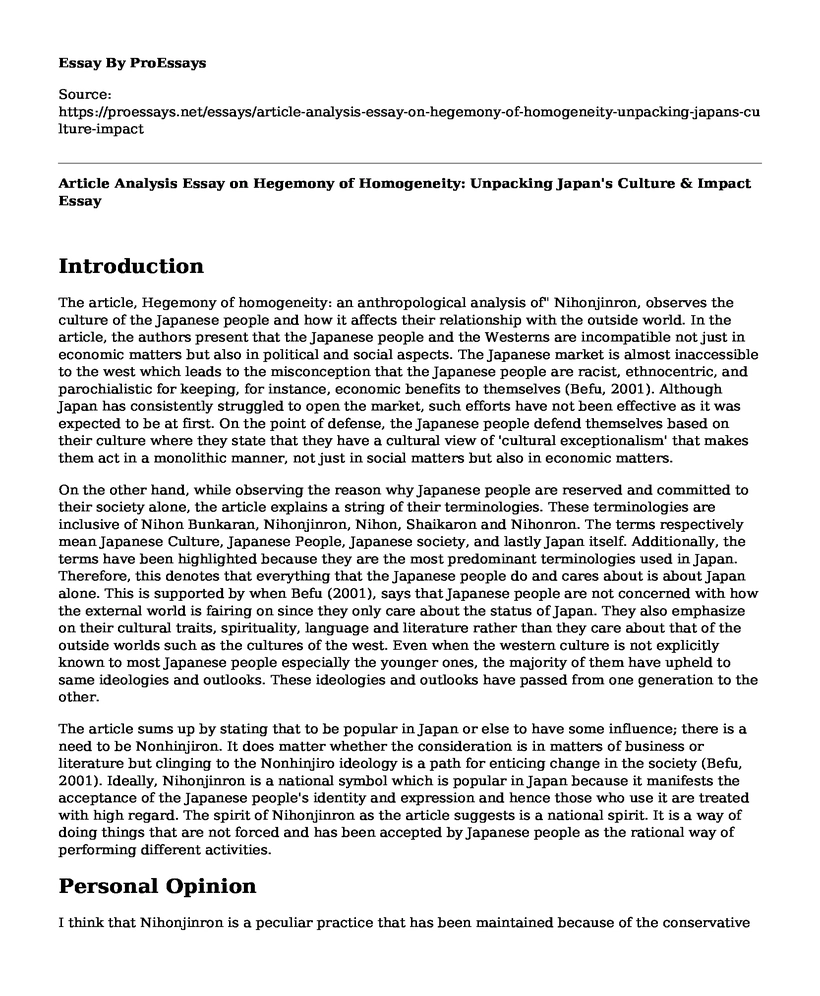Introduction
The article, Hegemony of homogeneity: an anthropological analysis of" Nihonjinron, observes the culture of the Japanese people and how it affects their relationship with the outside world. In the article, the authors present that the Japanese people and the Westerns are incompatible not just in economic matters but also in political and social aspects. The Japanese market is almost inaccessible to the west which leads to the misconception that the Japanese people are racist, ethnocentric, and parochialistic for keeping, for instance, economic benefits to themselves (Befu, 2001). Although Japan has consistently struggled to open the market, such efforts have not been effective as it was expected to be at first. On the point of defense, the Japanese people defend themselves based on their culture where they state that they have a cultural view of 'cultural exceptionalism' that makes them act in a monolithic manner, not just in social matters but also in economic matters.
On the other hand, while observing the reason why Japanese people are reserved and committed to their society alone, the article explains a string of their terminologies. These terminologies are inclusive of Nihon Bunkaran, Nihonjinron, Nihon, Shaikaron and Nihonron. The terms respectively mean Japanese Culture, Japanese People, Japanese society, and lastly Japan itself. Additionally, the terms have been highlighted because they are the most predominant terminologies used in Japan. Therefore, this denotes that everything that the Japanese people do and cares about is about Japan alone. This is supported by when Befu (2001), says that Japanese people are not concerned with how the external world is fairing on since they only care about the status of Japan. They also emphasize on their cultural traits, spirituality, language and literature rather than they care about that of the outside worlds such as the cultures of the west. Even when the western culture is not explicitly known to most Japanese people especially the younger ones, the majority of them have upheld to same ideologies and outlooks. These ideologies and outlooks have passed from one generation to the other.
The article sums up by stating that to be popular in Japan or else to have some influence; there is a need to be Nonhinjiron. It does matter whether the consideration is in matters of business or literature but clinging to the Nonhinjiro ideology is a path for enticing change in the society (Befu, 2001). Ideally, Nihonjinron is a national symbol which is popular in Japan because it manifests the acceptance of the Japanese people's identity and expression and hence those who use it are treated with high regard. The spirit of Nihonjinron as the article suggests is a national spirit. It is a way of doing things that are not forced and has been accepted by Japanese people as the rational way of performing different activities.
Personal Opinion
I think that Nihonjinron is a peculiar practice that has been maintained because of the conservative nature of the Japanese people. They are naturally conservative, and hence they believe from their very basic outlook that Nihonjinron is their culture which they also should follow relentlessly. Moreover, after having been greatly affected by World War 2, the Japanese people could have had a collective view of themselves and believe that everything they do should be about themselves and not the external world. Therefore, I think that this practice is made stronger by Japanese people view of the west as still being manipulative. Additionally, although the Nihonjinron ideology cannot be dropped entirely by Japanese people, there is a need for the western countries' government to formulate plans for its inclusiveness in their culture rather than opposing it.
References
Befu, H. (2001). Hegemony of homogeneity: an anthropological analysis of" Nihonjinron" (Vol. 5). Trans Pacific Press.
Cite this page
Article Analysis Essay on Hegemony of Homogeneity: Unpacking Japan's Culture & Impact. (2023, Jan 04). Retrieved from https://proessays.net/essays/article-analysis-essay-on-hegemony-of-homogeneity-unpacking-japans-culture-impact
If you are the original author of this essay and no longer wish to have it published on the ProEssays website, please click below to request its removal:
- History of Latinos in Arizona Essay Example
- The Reasons for the Shifting Populations Into Texas Paper Example
- Midterm Assessment Critical Analysis on Entrepreneurship in the Ethnic Groups
- Essay Example on Confucianism: A Vital Force in Arising China's Social Structures
- Essay Example on Societal Changes, Healthcare System & Economic Growth: A Look Ahead
- Sub-Sahara: Helping Struggling Nations Thrive - Essay Sample
- Native Americans vs. European Americans - Essay Sample







